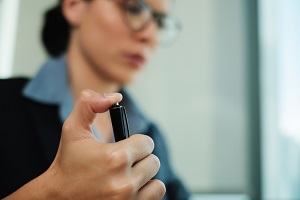 Do you get angry when you hear someone chewing their food?
Do you get angry when you hear someone chewing their food?
Does loud breathing make you want to punch the perpetrator?
If you have emotional reactions to sounds, you may have misophonia.
Triggers of Misophonia
People with misophonia tend to be bothered by everyday sounds that most of us don’t even notice. These sounds cause a fight-or-flight response that makes the person want to remove themselves from the sound.
Common triggers include:
- Loud chewing (or sight of eating with mouth open)
- Typical eating sounds
- Breathing
- Certain speaking sounds (such as S, P, K)
- Repetitive sounds such as pen clicking
- Sniffing, throat clearing
- Heels on hard surfaces
Responding To Sounds Differently
There has not been extensive research conducted on misophonia, with scientists unsure of how common it is. Still, it is a real disorder – typically appearing around age 12 – that affects a person’s mental health, including their ability to socialize and function in typical situations.
Studies are starting to discover causes for the disorder. A British study studied 20 adults with misophonia and 22 without it. Researchers had everyone rate the unpleasantness of sounds, including typical triggers sounds such as eating and breathing, more universally unpleasant sounds (babies crying, screams) and neutral sounds such as the rain.
Those with misophonia said the common trigger sounds were highly disturbing, while the 22 others did not. The two groups of subjects were similar in their rankings of the neutral and universally disturbing sounds. Further, trigger sounds caused more stress signals (sweating, increased heart rate) in those with misophonia than in those without the condition.
What Causes Misophonia
Researchers used fMRI scans to measure activity in the anterior insular cortex, part of the brain that affects anger and connects outside stimuli – including sounds – with organs including the heart. The study discovered that those with misophonia had much more activity in other parts of the brain when confronted with common trigger sounds. This activity was discovered in parts of the brain handling fear and long-term memories.
Treatments for misophonia include cognitive behavioral therapy or auditory distraction through the use of white noise or headphones. Contact the Misophonia Association for more information about the condition.
For more information about services available at Audio Help Hearing Centers in New York City, Scarsdale and Stamford, Connecticut, call us at 914-529-4150.

